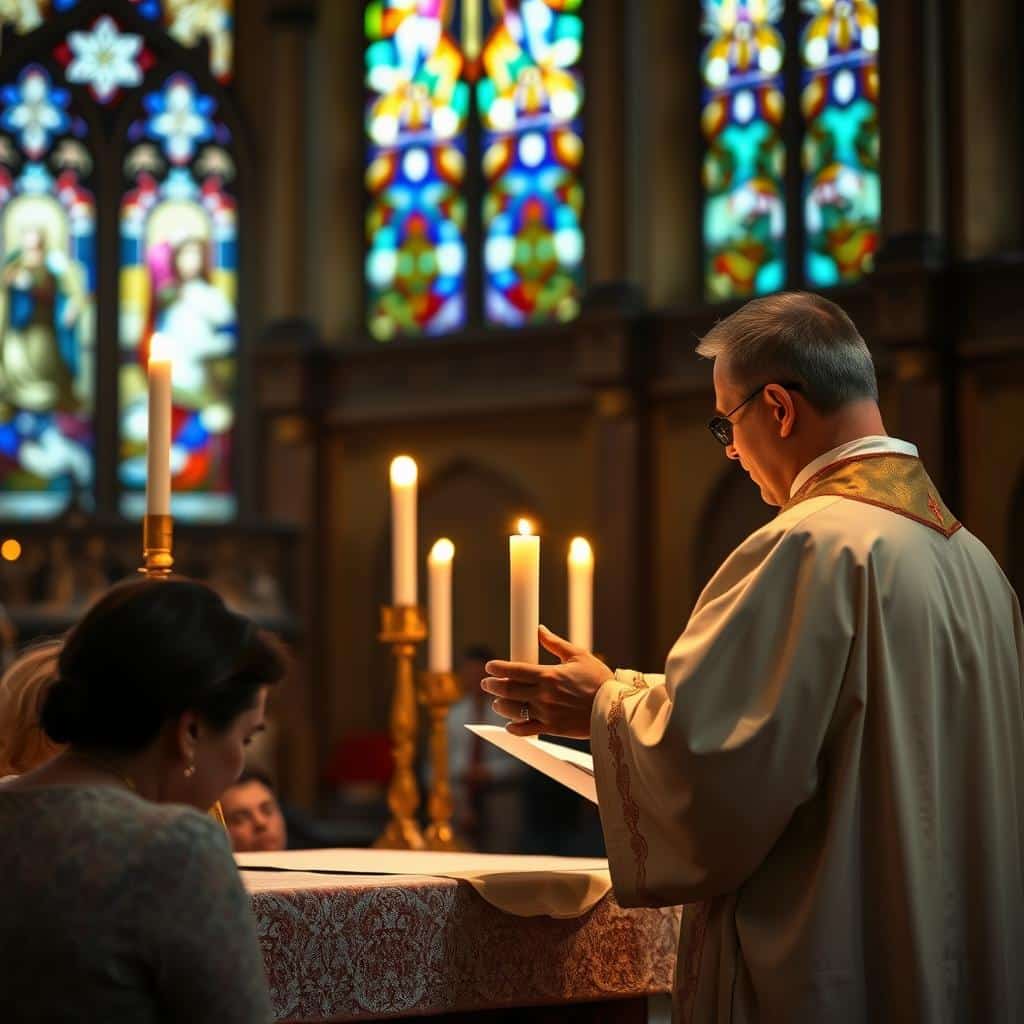The 27th Sunday in Ordinary Time, Cycle C teaches us to trust God even when things seem unfair or confusing. The readings for this Sunday offer important lessons on faith, the gift of the Spirit, and the strength of small faith.
The biblical readings, including Habakkuk 1:2-3; 2:2-4, Psalm 95, 2 Timothy 1:6-8, 13-14, and Luke 17:5-10, guide us on our faith journey. They encourage us to keep going and trust in God’s plan.
Key Takeaways
- Trusting God is essential during uncertain times.
- The readings provide insights into living by faith.
- The gift of the Spirit empowers us to persevere.
- Small faith can have a significant impact.
- Persevering in faith is crucial for spiritual growth.
The Liturgical Significance of Ordinary Time
Ordinary Time is a key part of the Church’s year. It comes after Christmas and Easter. This season focuses on Jesus’ teachings and the apostles’, helping Catholics grow in their faith.
Understanding the Season After Pentecost
Ordinary Time is linked to Pentecost, when the Holy Spirit came to the disciples. It’s a time for the Church to think about Christ and how faith affects our lives. Through Sunday worship, Catholics are urged to live their faith every day.
- Reflection on the teachings of Jesus
- Exploration of the apostles’ writings
- Emphasis on living faith in daily life
The Spiritual Journey Through Cycle C
Cycle C of the liturgical calendar offers a special spiritual path. It includes readings that make us think about faith, staying strong, and helping others. As Catholics go through Ordinary Time, they learn more about religious observance and its importance in our relationship with God.
- Deepening faith through scripture
- Practicing perseverance in the face of challenges
- Embracing service as a form of worship
By diving into the liturgical readings of Ordinary Time, Catholics can make their faith more real and alive.
Thematic Overview of the Twenty-seventh Sunday in Ordinary Time, Cycle C
The 27th Sunday in Ordinary Time, Cycle C, is a special time to explore faith, perseverance, and service. These bible passages weave together to offer spiritual guidance. They help us understand God’s plan better.

Faith, Perseverance, and Service as Central Themes
The gospel reflections for this Sunday focus on the role of faith in our relationship with God. They remind us to keep our faith strong, even when things get tough. Serving others is seen as a key part of our faith, calling for humility and kindness.
- Faith is the cornerstone of our spiritual lives, guiding our actions and decisions.
- Perseverance is essential in maintaining our faith, especially during challenging times.
- Service to others is a manifestation of our faith in action, reflecting the love of Christ.
How These Readings Connect to Our Spiritual Lives
The catholic liturgy for the 27th Sunday in Ordinary Time, Cycle C, helps us see how these themes apply to our lives. By thinking about the readings, we can look at our faith, perseverance, and service. This can help us connect more deeply with God and live out our faith in our communities.
- Reflecting on the readings can help us identify areas where we need to grow in faith.
- Practicing perseverance in our daily lives can strengthen our faith and our relationship with God.
- Engaging in acts of service can deepen our understanding of God’s love and mercy.
Habakkuk’s Lament and God’s Response
In the book of Habakkuk, we see a prophet struggling with God’s silence in the face of injustice. This theme is key in Cycle C of the Ordinary Time liturgical calendar. The prophet’s cry to God mirrors the struggles many have with evil and suffering.
The Prophet’s Cry in Habakkuk 1:2-3
Habakkuk’s lament is a heartfelt expression of his distress. He says, “How long, O Lord, I cry for help, but you do not listen!” (Habakkuk 1:2). This is not just a personal plea but also a voice for the suffering faithful. The prophet wonders why the wicked seem to thrive while the righteous suffer.

The Divine Answer in Habakkuk 2:2-4
God’s response to Habakkuk’s lament is both comforting and challenging. The Lord tells Habakkuk to “write down the vision and make it plain on tablets, so that a runner may read it” (Habakkuk 2:2). This answer stresses the importance of faith and trust in God’s plan. It says, “The righteous shall live by their faith” (Habakkuk 2:4), emphasizing the need to live by faith, even when things are uncertain and unjust.
This message is especially relevant on the twenty-seventh Sunday in Ordinary Time, Cycle C. It urges the faithful to keep trusting in God. The response encourages believers to be patient and faithful, even when faced with seemingly insurmountable challenges.
Living by Faith in Times of Uncertainty
The prophet Habakkuk’s message tells us faith is key when things are unsure. Looking at the readings for the 27th Sunday in Ordinary Time, Cycle C, we learn more about living by faith. It’s not just believing; it’s a way of life that shapes our choices and actions.

The Meaning of “The Righteous Shall Live by Faith”
The phrase “the righteous shall live by faith” from Habakkuk shows faith’s role in our bond with God. It’s about trusting God’s promises, not our own thoughts or situations. This faith is not just sitting back; it’s active and guides our daily lives.
To live by faith means trusting God’s kindness and care, even when we don’t get it. It’s about sticking to God’s rules and living with justice and kindness.
Patience as a Spiritual Discipline
Patience is a big part of living by faith. It’s about staying strong and waiting for God’s time, not rushing ourselves. Patience grows through prayer, thinking deeply, and trusting in God’s plan.
The table below shows some key parts of patience as a spiritual practice:
| Aspect | Description | Practice |
|---|---|---|
| Trust | Believing in God’s goodness and plan | Prayer and reflection |
| Endurance | Persevering through tough times | Seeking support from community |
| Waiting | Waiting for God’s timing | Meditation and silence |
By practicing patience, we can grow our faith and face life’s unknowns with more trust in God.
The Call to Worship in Psalm 95
In the rich tapestry of Catholic liturgy, Psalm 95 stands out as a powerful call to worship. This psalm is not just a historical or literary piece. It is a living part of the Church’s prayer life, inviting believers to reflect on their relationship with God.

Joyful Praise and Thanksgiving
Psalm 95 begins with an invitation to come before God with joyful praise and thanksgiving (Psalm 95:1-2). It reminds us that God is our Creator and Savior, deserving of our reverence and adoration. The psalmist encourages the faithful to sing to the Lord and shout with joy, expressing their faith through music and communal prayer.
“O come, let us sing to the Lord; let us make a joyful noise to the rock of our salvation!” (Psalm 95:1)
This joyful noise is not just a celebration but a form of prayer. It acknowledges God’s sovereignty and salvation. It calls the community to gather, share in the joy of faith, and express gratitude for God’s blessings.
The Warning Against Hardened Hearts
While Psalm 95 invites believers to joyful worship, it also contains a solemn warning against hardening one’s heart (Psalm 95:6-9). The psalmist recalls the lessons from Meribah and Massah, where the Israelites tested God’s patience and mercy. This serves as a reminder to remain faithful and obedient to God’s will, avoiding the pitfalls of unbelief and rebellion.
- Remembering God’s past deeds and faithfulness
- Being mindful of the dangers of unbelief
- Keeping one’s heart open to God’s guidance
The warning is clear: a hardened heart can lead to missing out on God’s blessings and guidance. Thus, Psalm 95 calls the faithful to a life of faithfulness and trust in God. It echoes the themes of perseverance and service found in the other readings of the Twenty-seventh Sunday in Ordinary Time, Cycle C.
Rekindling the Gift of Faith in 2 Timothy
The Apostle Paul’s words in 2 Timothy remind us to rekindle our faith. Paul’s encouragement invites us to check our commitment to faith.
Paul’s Encouragement to Timothy
Paul tells Timothy to “stir into flame the gift of God” (2 Timothy 1:6-8). He stresses the need for courage, love, and self-discipline in faith. Paul says God gave us power, love, and self-control, not fear.
Paul’s words challenge us to nurture our faith. We must think about how we grow our faith and live it with courage and love.

Guarding the Good Deposit
In 2 Timothy 1:13-14, Paul urges Timothy to guard the good deposit given to him. This deposit is the faith and teachings passed down. Paul stresses the importance of holding onto these teachings.
Guarding the deposit means staying true to Christianity’s core teachings. It means being careful against false teachings and staying grounded in truth.
| Key Aspects | Paul’s Guidance | Our Response |
|---|---|---|
| Rekindling Faith | Stir into flame the gift of God (2 Timothy 1:6) | Actively nurture faith through prayer and service |
| Guarding the Deposit | Hold fast to the authentic teachings (2 Timothy 1:13-14) | Remain faithful to core Christian teachings |
By following Paul’s advice in 2 Timothy, we can deepen our faith. This makes our spiritual lives richer and strengthens our faith communities.
Courage and Testimony in Christian Life
The Christian faith is more than just believing. It’s about showing courage in sharing that belief. Apostle Paul’s letters to Timothy show how crucial courage is. It’s guided by the Holy Spirit, helping Christians on their spiritual path.
Overcoming Shame and Fear
Living a courageous Christian life means facing shame and fear head-on. Paul tells Timothy to revive the gift of God’s Spirit. This Spirit brings power, love, and self-discipline (2 Timothy 1:7). Believers can then share their stories without fear, trusting in God’s strength.
The Holy Spirit’s Role in Preserving Faith
The Holy Spirit is key in keeping faith strong and courage alive. Paul says the Spirit gives us power and love. This lets us be brave in sharing our faith. Here’s how the Holy Spirit helps:
| Aspect | Description |
|---|---|
| Power | Empowers believers to be courageous in their faith |
| Love | Guides believers to act in love, even in challenging situations |
| Self-Discipline | Helps believers to remain disciplined and focused on their spiritual journey |

With the Holy Spirit’s help, Christians can find the courage to share their faith. They can live their beliefs boldly.
The Apostles’ Request for Increased Faith
The apostles asked Jesus for more faith. Jesus then shared a deep lesson on faith. In Luke 17:5-6, He showed how even a little faith can do great things.
Analyzing Luke 17:5-6 in Context
In Luke 17:5-6, Jesus says, “If you had faith the size of a mustard seed, you could say to this mulberry tree, ‘Be uprooted and planted in the sea,’ and it would obey you.” He uses a mustard seed to show faith’s power. Jesus teaches the apostles to trust in God, even when faith seems weak.

The Power of Even Small Faith
Jesus teaches that small faith is powerful. Faith is not about how big it is, but about trusting God. As Pope Francis said, “Faith is not a sentimental feeling, but a decision to entrust oneself to God.” A little faith can achieve big things because it connects us to God’s power.
Building faith means trusting God’s plan and following His will. This way, we can see the amazing power of faith in our lives, just like the apostles did.
“Faith is to believe what you do not see; the reward of this faith is to see what you believe.”
Reflecting on Jesus’ words in Luke 17:5-6 encourages us to grow our faith. We learn that even a small amount can lead to big results.
Jesus’ Teaching on Humble Service
In the Gospel of Luke, Jesus teaches a profound lesson on humble service through the parable of the dutiful servant. This teaching is crucial for understanding the Christian approach to service. It shows its significance in Catholic liturgy.

The Parable of the Dutiful Servant (Luke 17:7-10)
The parable in Luke 17:7-10 compares the Kingdom of God to a diligent servant. Jesus says serving God is not about seeking reward. It’s about fulfilling one’s duty.
This parable challenges the usual view of service. It shows that a servant works out of duty, not for personal gain. It encourages Christians to serve God and others without expecting anything in return.
Duty, Merit, and Grace in Christian Service
The ideas of duty, merit, and grace are closely tied in Christian service. Serving God is seen as a duty. Yet, the idea of merit suggests a reward for faithful service.
However, Jesus teaches that even when we do our duty, we are still seen as unworthy servants. This view highlights the role of grace in Christian service. It shows that our actions are not for reward but because of the grace we’ve received.
So, humble service in the Christian view is about understanding our relationship with God. It’s about recognizing that our service is a response to His grace.
Theological Reflections on Faith and Works
The scriptures for the 27th Sunday in Ordinary Time, Cycle C, delve into the bond between our beliefs and actions. They show that faith and works are inseparable. This idea is key to the Catholic view of living as a Christian.

The Inseparable Nature of Belief and Action
The Letter to the Hebrews and the Gospel of Luke share a common message. They say faith is not just believing but is tied to doing. The righteous shall live by faith (Hebrews 10:38), and this faith is shown through our actions. This view highlights the need to live out our faith in real ways, showing God’s grace at work in us.
In the Catholic liturgy, this bond is celebrated through the sacraments and the liturgical cycle. These elements help us integrate faith and works. By taking part in the Eucharist and doing acts of service and charity, we show the faith we claim.
Avoiding Both Presumption and Works-Righteousness
The readings also warn against the dangers of presumption and works-righteousness. We must not think we have God’s favor without showing our faith. Yet, our actions are not done to earn God’s favor but as a response to His grace. Finding this balance is essential for a healthy spiritual life, teaching us humility and trust in God’s mercy.
In the Catholic liturgy, this balance is kept by focusing on God’s grace and our response to it. Understanding our actions as a fruit of faith and a response to God’s love helps us avoid the traps of presumption and legalism.
Practical Applications for Daily Living
Reflecting on the 27th Sunday in Ordinary Time, Cycle C, we find ways to live our faith every day. The readings urge us to deepen our faith and serve others with humility. This guides our actions and choices.
Cultivating Patient Faith in Personal Struggles
Building patient faith means trusting God’s plan, even when things are tough. Habakkuk’s story and God’s answer teach us faith is about trusting, not knowing everything.
To grow patient faith in our struggles, we can:
- Pray and reflect to understand God’s plan better.
- Find support in our faith community during hard times.
- Help others through service, which can take our minds off our problems.

Embracing Humble Service in Family and Community
Living out the Gospel by serving humbly in our families and communities is key. Jesus’ story of the dutiful servant teaches us to serve without seeking praise.
| Ways to Serve | Family | Community |
|---|---|---|
| Volunteering Time | Helping with household chores | Participating in local community service projects |
| Offering Skills | Teaching family members a new skill | Using professional skills for community benefit |
| Providing Support | Being present for family members in need | Supporting local charities and organizations |
By serving humbly, we not only help others but also grow in faith and understand God’s love better.
Prayer Reflections Based on the Readings
The readings for the 27th Sunday in Ordinary Time, Cycle C, invite us to deepen our prayer. They offer a rich source for prayer, encouraging us to think about our faith, trust, and service.
Meditative Prayers Inspired by Habakkuk and Psalm 95
Habakkuk’s lament and God’s answer are powerful for prayer. We can pray, “Lord, help me to trust in Your timing and to live by faith, even when circumstances seem uncertain.” Psalm 95 encourages us to praise and thank God, reminding us not to harden our hearts. A prayer inspired by this psalm could be, “May our hearts remain open to Your word, O Lord, and may we never cease to praise You.”

Prayers for Courage and Faith from 2 Timothy and Luke
The readings from 2 Timothy and Luke guide us on courage and faith. They urge us to revive our faith and trust in the Holy Spirit. A prayer inspired by these readings could be, “Lord, grant us the courage to proclaim our faith boldly and to serve humbly, trusting in Your grace and guidance.” Reflecting on the parable of the dutiful servant, we can pray for the grace to serve with humility. We recognize our service as a response to Your gift of salvation.
Connecting Scripture to Church Teaching
The bond between scripture and Church teaching is key to grasping faith, hope, and charity. The Catholic Church’s teachings are deeply rooted in the Bible. This connection enriches our spiritual journey.
Catechism References on Faith, Hope, and Charity
The Catechism of the Catholic Church offers detailed insights into the virtues. It says faith is believing in God and all He has revealed to us (CCC, 1814). Hope is about wanting eternal life and happiness with God (CCC, 1817). Charity, or love, is about loving God and others for His sake (CCC, 1822).
- Faith is about trusting in God’s promises and revelations.
- Hope involves desiring eternal life and happiness with God.
- Charity is loving God and our neighbors for God’s sake.
Insights from Papal and Conciliar Documents
Papal encyclicals and council documents shed light on faith, hope, and charity. For instance, Pope Benedict XVI’s Spe Salvi explores Christian hope. The Second Vatican Council’s Lumen Gentium also teaches on these virtues.
By studying these sources, we can better understand scripture and Church teaching. This helps us deepen our faith commitment.

Celebrating the Liturgy as a Family and Community
Celebrating the liturgy is key to community life. It helps us connect deeper with each other. The liturgy is a foundation for our spiritual growth, bringing us together in our faith journey.

Parish Activities for Deepening Understanding
Parishes can do many things to help us understand the liturgy better. Some good ideas include:
- Starting liturgy study groups to learn about its history and importance.
- Hosting workshops on liturgical music to show how music enriches worship.
- Encouraging participation in liturgical ministries like altar servers, lectors, or Holy Communion ministers.
Family Discussions and Practices
Families can also make the liturgy a part of their daily lives. Here are some ideas:
- Having post-Mass discussions about the readings and homily, thinking about how they relate to our lives.
- Practicing prayer together as a family, using parts of the liturgy like the Liturgy of the Hours or the Rosary.
- Setting up a family prayer space that matches the liturgical season, using symbols and colors to make it special.
By taking part in these activities, both parishes and families can grow in their understanding of the liturgy. This strengthens their faith and community ties.
Conclusion: Growing in Faith, Patience, and Humble Service
Reflecting on the 27th Sunday in Ordinary Time, Cycle C, reminds us of faith, patience, and service’s value. Habakkuk’s lament and God’s answer teach us to trust God, even when things are uncertain.
The Apostle Paul’s words to Timothy in 2 Timothy urge us to revive our faith. Jesus’ teachings on service in Luke 17 push us to be humble. We learn our service is a thank you to God’s grace.
We aim to live these values every day. This means having patient faith, staying strong, and serving others without expecting anything in return. By doing so, we grow closer to God and each other. We also become better at sharing the Gospel.
May the Holy Spirit lead us and our faith community support us. Together, let’s grow in faith, patience, and service.





